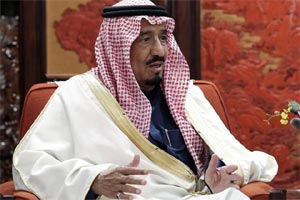Saudi Arabia, the world’s largest crude oil exporter has ousted its long-time oil minister Ali al-Naimi, replacing him with Khalid al-Falih. Falih is the chairman of the state oil giant Saudi Aramco. The decision is part of larger ongoing government shakeup.
A royal decree quoted on state television said the petroleum ministry had been renamed to become the Ministry of Energy, Industry and Mineral Resources, and that Falih would give up his other post, that of health minister.
The changes come as the government plans wide-ranging reforms aimed at overhauling the Saudi economy amid lower oil prices that have eroded state revenues.
So, who is Khalid al-Falih?
After graduating in 1982 with a degree in mechanical engineering from Texas A&M University, Falih has spent more than 30 years in Aramco, where he was chief executive from 2009 until he was named chairman last year.
He is one of a handful of Saudi figures whose views are closely watched by traders and analysts for any insight on the kingdom’s oil thinking. Falih has for years been considered a possible successor to Naimi, who also stepped up to oil minister after heading Aramco.
Ali al-Naimi’s over 20 years career as Saudi Arabia’s oil minister:
Naimi had been the oil minister since 1995. Naimi, who turned 80 in August, began his career in oil at the age of 12 as an office boy at Aramco, and ends it as one of the country’s highest-ranking non-royals. He becomes an adviser at the Royal Court.
Naimi has always tried to use Saudi financial muscle and oil supply scale to drive out higher-cost producers or rivals during oil market downturns. He did so while helping to steer OPEC through a minefield of instability provided by the political travails of several member countries – including wars involving Iraq and Libya, and sanctions on Riyadh’s main strategic rival, Iran.
Saudi Arabia’s dominant market share and historical ability to influence prices by loosening or tightening its taps gave al-Naimi exceptional influence at meetings of the oil cartel OPEC, where the kingdom is by far the largest producer and de facto policy-maker. His brief utterances on the sidelines of OPEC meetings often had the power to swing global oil prices.
He has presided over a controversial strategy of keeping production levels high despite the drop in prices over the past two years in an effort to drive more expensive producers in the U.S. and elsewhere out of the market. That has led to a glut of supply.
Saudi Arabia’s future strategy:
Lower oil prices since mid-2014 pushed Saudi Arabia into a budget deficit of nearly $100 billion last year and a projected deficit this year of $87 billion. Despite efforts to limit reliance on its main export, oil accounted for more than 70 percent of the state’s revenue in 2015.
Under a new Saudi leadership led by King Salman, the king’s son Deputy Crown Prince Mohammed bin Salman has largely been overseeing Saudi economic policy along with a handful of new ministers.
Among the changes planned by Mohammed bin Salman and announced last month was a plan to publicly list less than five percent of Aramco to create a massive sovereign wealth fund to develop its cities.
Aramco boasts the world’s largest oil reserves and produces some 10 million barrels of crude a day, giving it outsized influence over world energy markets. The deputy crown prince put the estimated value of Aramco at more than $2 trillion.
A number of other royal decrees announced Saturday as part of the government’s restructuring also saw several ministry names changed and the removal of six ministers, including al-Naimi. The other replacements include the ministers of hajj, commerce and industry, social affairs, health and transportation.
Former Hajj Minister Bandar al-Hajjar, who helped oversee last year’s tragic pilgrimage that saw more than 100 pilgrims killed by a crane collapse and more than 2,400 killed in a crush of crowds, was replaced by Mohammed Bintin.
Also, new Energy Minister al-Falih was replaced as Health Minister by former Commerce and Industry Minister Tawfiq al-Rabiah. Former Social Affairs Minister Majed al-Qasabi was named Minister of Commerce and Investment, one of the newly named ministries. The Social Affairs Ministry will be combined with the Labor Ministry under a new ministry called the Labor and Social Development Ministry.


